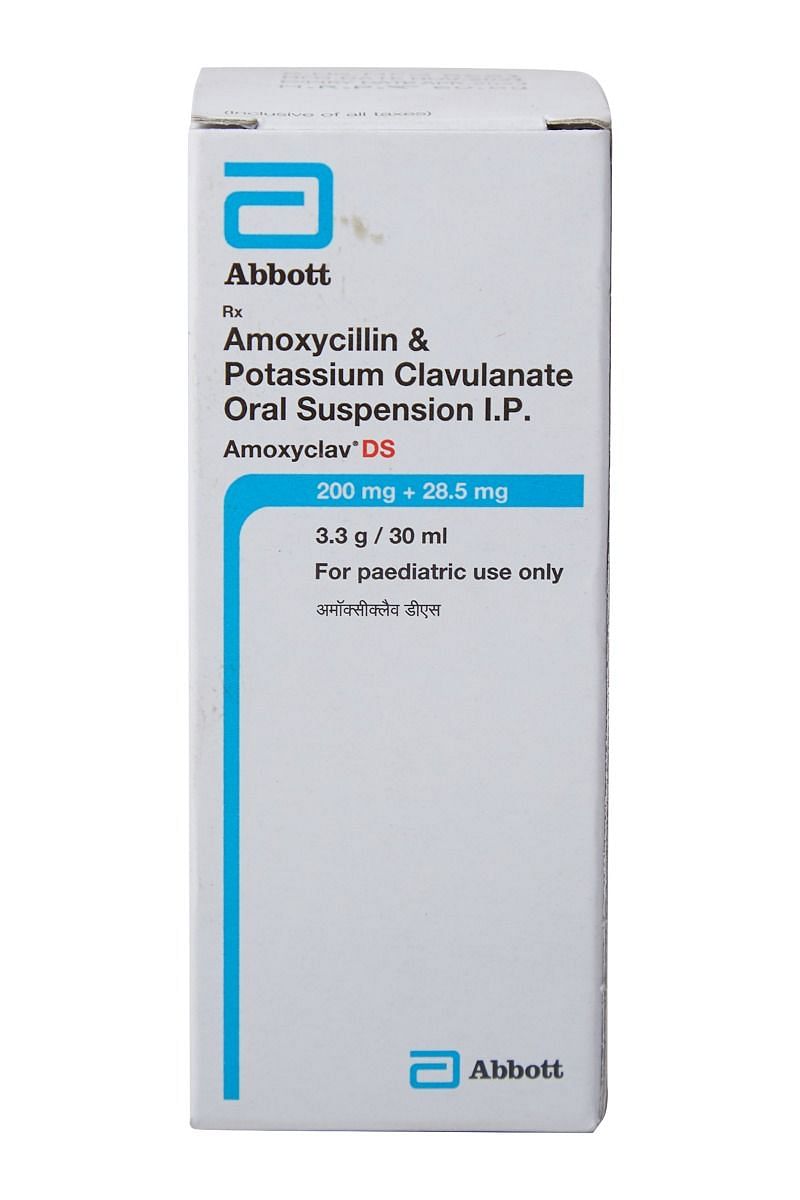
Moxir CV Dry Syrup
Manufacturer
Ravic Healthcare
Salt Composition
Amoxycillin (200mg) + Clavulanic Acid (28.5mg)
Key Information
Short Description
Moxir CV Dry Syrup is an antibiotic medicine that helps treat bacterial infections of the ear, nose, throat, chest, lungs, teeth, skin, and urinary tract.
Dosage Form
Dry Syrup
Introduction
Moxir CV Dry Syrup is an antibiotic medicine that helps treat bacterial infections of the ear, nose, throat, chest, lungs, teeth, skin, and urinary tract. It is capable of killing bacteria that have become resistant to other therapies and thus also helps treat tuberculosis that is resistant to other treatments.
Directions for Use
Your child must complete the entire course of antibiotics. Stopping too soon may cause the bacteria to multiply again or cause another infection.
How it works
Moxir CV Dry Syrup is an antibiotic. It has two active agents amoxycillin and clavulanic acid. Amoxycillin works by preventing the formation of the bacterial protective covering (cell wall) essential for the survival of the bacteria. Whereas clavulanic acid serves a special purpose of inhibiting an enzyme (beta-lactamase) that is produced by resistant bacteria. This makes the combination of amoxycillin and clavulanic acid an effective line of treatment for many types of infections.
Quick Tips
Your child must complete the entire course of antibiotics. Stopping too soon may cause the bacteria to multiply again or cause another infection. Your child may have a bitter taste in the mouth after the intake of Moxir CV Dry Syrup. Eating citrus fruit or sipping plenty of water or fruit juice may help. Encourage your child to drink plenty of water in case diarrhea develops as a side effect. Never give Moxir CV Dry Syrup until and unless prescribed by the doctor. Do not give Moxir CV Dry Syrup to treat common cold and flu-like symptoms caused by viruses. Never save medicine for future illnesses. Check ‘expiry’ before giving Moxir CV Dry Syrup to your child. Immediately discard all the expired medicines. Stop Moxir CV Dry Syrup immediately if your child develops an itchy rash, facial swelling, or breathing difficulty. Report to the doctor without any delay.
Related Medicines

Moxikind-CV Dry Syrup

Advent 228.5mg Dry Syrup Tangy Orange

Amoxyclav Dry Syrup

Alnos CV Dry Syrup

Rzcv Bid Dry Syrup

Xylum Dry Syrup

Moxilink C Dry Syrup

Duet DS Dry Syrup

Amcv Dry Syrup

Toxiclav Dry Syrup
Frequently asked questions
Can other medicines be given at the same time as Moxir CV Dry Syrup?
Moxir CV Dry Syrup may interact with other medications or substances. It is important to tell your child’s doctor about any other medicines they are taking before starting Moxir CV Dry Syrup. Consulting your child’s doctor before administering any medication is crucial for safety.
Can I get my child vaccinated while on treatment with Moxir CV Dry Syrup?
Antibiotics typically do not interfere with the ingredients in vaccines or cause a negative reaction in children who have recently received one. However, it is crucial to consult your child's doctor before administering any medication after an infection. As soon as your child feels better, they can receive their vaccinations.
Which lab tests may my child undergo while taking Moxir CV Dry Syrup on a long-term basis?
The doctor might order periodic kidney and liver function tests if treatment is prolonged to monitor your child's condition.
Can I give a higher than the recommended dose of Moxir CV Dry Syrup to my child?
Giving a dose higher than the recommended dosage of this medicine can increase the risk of side effects. If your child experiences worsened symptoms, please contact your doctor for reevaluation.
Can I stop giving Moxir CV Dry Syrup to my child when the symptoms are relieved?
No, do not stop giving this medicine unless the full course of treatment is complete, even if you feel better. Symptoms may improve before the infection is fully eradicated, so continue medication for the prescribed duration.
Can the use of Moxir CV Dry Syrup cause diarrhea?
Yes, Moxir CV Dry Syrup can cause diarrhea. It is a type of antibiotic that kills harmful bacteria. Additionally, it may affect beneficial bacteria in your child’s stomach and cause diarrhea. Encourage your child to drink plenty of fluids if they experience diarrhea. Seek medical advice from your doctor if diarrhea persists and if you notice any signs of dehydration such as reduced urination with dark-colored and strong-smelling urine. Do not administer any other medication to your child without consulting a doctor.
Do all viral common colds result in secondary bacterial infection?
Most common cold cases do not lead to secondary bacterial infections, as they are typically caused by viruses. While antibiotics are effective against bacteria, giving them during a viral infection can increase the risk of side effects and should only be used after consulting with your child's doctor.
The mucus coming out of my child’s nose is yellow-green. Is it a sign of a bacterial infection?
Yellow or green mucus in the nose does not necessarily indicate a bacterial infection. It is normal for mucus to thicken and change color during a common cold, lasting for 7 to 10 days. If you observe any concerning symptoms like difficulty breathing or severe throat discomfort, seek medical attention immediately.
Is there any sign which shows that my child needs immediate medical attention?
Call your child’s doctor right away if they experience allergic reactions (breathing difficulties, skin rash), gastrointestinal problems (diarrhea), and liver damage (weakness, paleness, vomiting). Although rare, these side effects are severe and require a healthcare professional's expertise.


